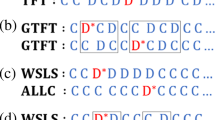Abstract
The Prisoner's Dilemma game1,2,3,4 is widely used to investigate how cooperation between unrelated individuals can evolve by natural selection. In this game, each player can either ‘cooperate’ (invest in a common good) or ‘defect’ (exploit the other's investment). If the opponent cooperates, you get R if you cooperate and T if you defect. If the opponent defects, you get S if you cooperate and P if you defect. Here T > R > 0 and P > S, so that ‘defect’ is the best response to any action by the opponent. Thus in a single play of the game, each player should defect. In our game, a fixed maximum number of rounds of the Prisoner's Dilemma game is played against the same opponent. A standard argument based on working backwards from the last round1,5 shows that defection on all rounds is the only stable outcome. In contrast, we show that if extrinsic factors maintain variation in behaviour, high levels of co-operation are stable. Our results highlight the importance of extrinsic variability in determining the outcome of evolutionary games.



Similar content being viewed by others
References
Luce, R. D. & Raiffa, H. Games and Decisions (Wiley, New York, 1957)
Axelrod, R. & Hamilton, W. D. The evolution of cooperation. Science 211, 1390–1396 (1981)
Axelrod, R. & Dion, D. The further evolution of cooperation. Science 242, 1385–1390 (1988)
Brembs, B. Chaos, cheating and cooperation: Potential solutions to the Prisoner's Dilemma. Oikos 76, 14–24 (1996)
Colman, A. M. Cooperation, psychological game theory, and the limitations of rationality in social interaction. Behav. Brain Sci. 26, 139–198 (2003)
Enquist, M. & Leimar, O. The evolution of cooperation in mobile organisms. Anim. Behav. 45, 747–757 (1993)
Fehr, E. & Fischbacher, U. The nature of human altruism. Nature 425, 785–791 (2003)
Camerer, C. Behavioral Game Theory (Princeton Univ. Press, Princeton, 2003)
Crowley, P. H. & Sargent, R. C. Whence tit-for-tat? Evol. Ecol. 10, 499–516 (1996)
Sherratt, T. N. & Roberts, G. The importance of phenotypic defectors in stabilizing reciprocal altruism. Behav. Ecol. 12, 313–317 (2001)
McKelvey, R. D. & Palfrey, T. R. An experimental study of the centipede game. Econometrica 60, 803–836 (1992)
Boyd, R. Mistakes allow evolutionary stability in the repeated Prisoner's Dilemma game. J. Theor. Biol. 136, 47–56 (1989)
Fudenberg, D. & Maskin, E. Evolution and cooperation in noisy repeated games. Am. Econ. Rev. 80, 274–279 (1990)
Nowak, M. & Sigmund, K. The evolution of stochastic strategies in the Prisoner's Dilemma. Acta Appl. Math. 20, 247–265 (1990)
Bendor, J., Kramer, R. M. & Stout, S. When in doubt. Cooperation in a noisy prisoner's dilemma. J. Conflict Resolut. 35, 691–719 (1991)
Nowak, M. & Sigmund, K. Tit for tat in heterogeneous populations. Nature 355, 250–252 (1992)
Nowak, M. & Sigmund, K. Chaos and the evolution of cooperation. Proc. Natl Acad. Sci. USA 90, 5091–5094 (1993)
Nowak, M. & Sigmund, K. A strategy of win-stay, lose-shift that outperforms tit-for-tat in the Prisoner's Dilemma game. Nature 364, 56–58 (1993)
Nowak, M. A., Sigmund, K. & Elsedy, E. Automata, repeated games and noise. J. Math. Biol. 33, 703–722 (1995)
Wu, J. Z. & Axelrod, R. How to cope with noise in the iterated prisoner's dilemma. J. Conflict Resolut. 39, 183–189 (1995)
Wahl, L. M. & Nowak, M. A. The continuous prisoner's dilemma: II. Linear reactive strategies with noise. J. Theor. Biol. 200, 323–338 (1999)
Lorberbaum, J. P., Bohning, D. E., Shastri, A. & Sine, L. E. Are there really no evolutionarily stable strategies in the iterated prisoner's dilemma? J. Theor. Biol. 214, 155–169 (2002)
Fishman, M. A., Lotem, A. & Stone, L. Heterogeneity stabilizes reciprocal altruism interactions. J. Theor. Biol. 209, 87–95 (2001)
Axelrod, R. More effective choice in the Prisoner's Dilemma. J. Conflict Resolut. 24, 379–403 (1980)
Heinsohn, R. & Packer, C. Complex cooperative strategies in group-territorial African lions. Science 269, 1260–1262 (1995)
Brockmann, H. J. The evolution of alternative strategies and tactics. Adv. Stud. Behav. 30, 1–51 (2001)
Henson, S. A. & Warner, R. R. Male and female alternative reproductive behaviors in fishes: a new approach using intersexual dynamics. Annu. Rev. Ecol. Syst. 28, 571–592 (1997)
Giraldeau, L. A. & Caraco, T. Social Foraging Theory (Princeton Univ. Press, Princeton, 2000)
Sober, E. & Wilson, D. S. Unto Others (Harvard Univ. Press, Cambridge, Massachusetts, 1998)
Boyd, R. & Richerson, P. J. Group selection among alternative evolutionarily stable strategies. J. Theor. Biol. 145, 331–342 (1990)
Acknowledgements
We thank A. Dornhaus, M. Enquist, E. Fehr and L.-A. Giraldeau for comments on a previous version of this Letter.Authors' contributions J.M.M. formulated the main ideas as a result of conversations with A.I.H.; J.M.M. also formulated the model, and was responsible for the material in Box 1; Z.B. carried out the computations, and prepared the figures; A.I.H. surveyed the literature, and had the main responsibility for writing the Letter.
Author information
Authors and Affiliations
Corresponding author
Ethics declarations
Competing interests
The authors declare that they have no competing financial interests.
Supplementary information
Supplementary Information
Payoffs and best responses in the game. (DOC 76 kb)
Rights and permissions
About this article
Cite this article
McNamara, J., Barta, Z. & Houston, A. Variation in behaviour promotes cooperation in the Prisoner's Dilemma game. Nature 428, 745–748 (2004). https://doi.org/10.1038/nature02432
Received:
Accepted:
Issue Date:
DOI: https://doi.org/10.1038/nature02432
- Springer Nature Limited
This article is cited by
-
Prisoner’s dilemma game model Based on historical strategy information
Scientific Reports (2023)
-
Resolving uncertainty in a social world
Nature Human Behaviour (2019)
-
Early ontogenic emergence of personality and its long-term persistence in a social spider
Behavioral Ecology and Sociobiology (2019)
-
Uncertainty about social interactions leads to the evolution of social heuristics
Nature Communications (2018)
-
The co-evolution of networks and prisoner’s dilemma game by considering sensitivity and visibility
Scientific Reports (2017)





